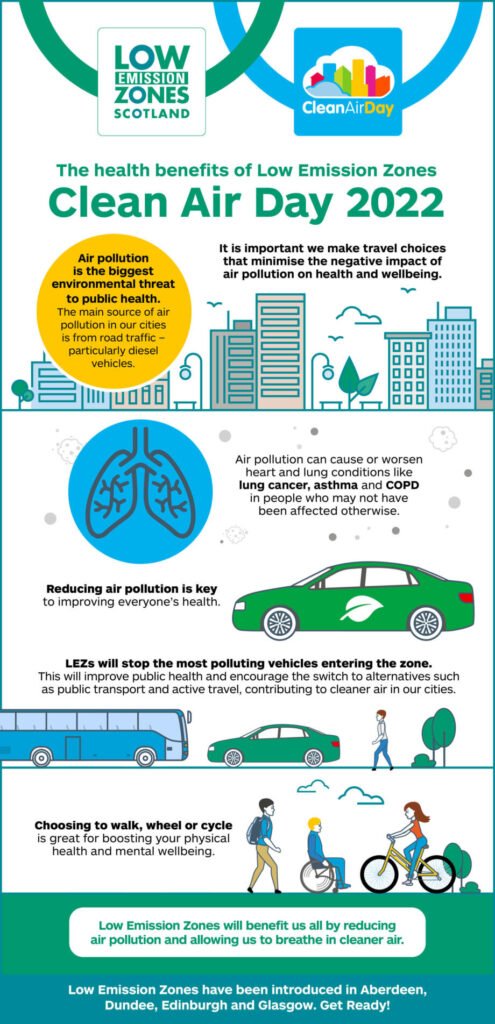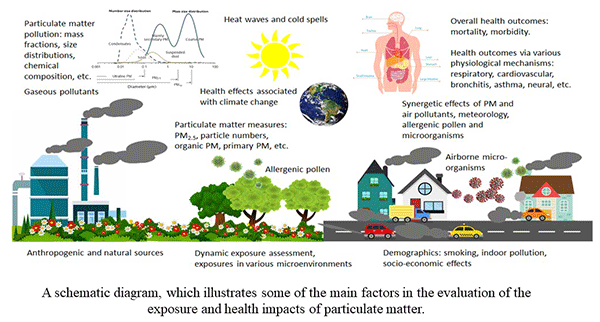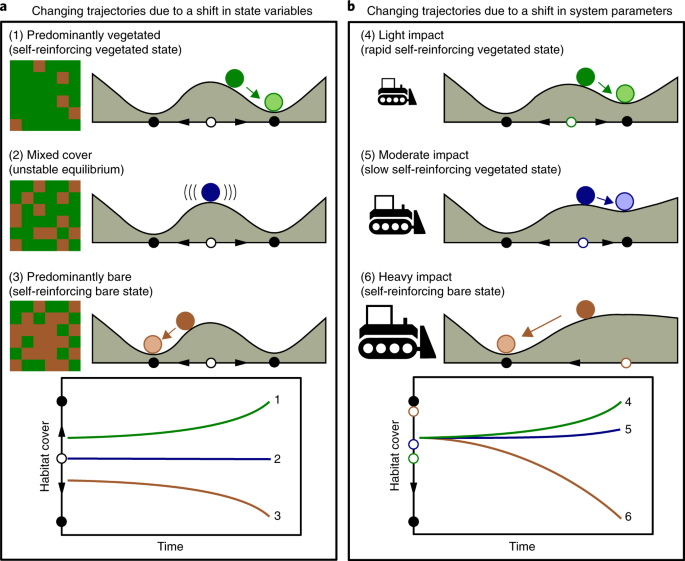Imagine a future where the sound of lawnmowers no longer fills the air with the smell of gasoline. Introducing hydrogen-powered commercial lawn mowers, a revolutionary solution that promises to transform how we maintain our lawns. With their innovative hydrogen fuel cell technology, these eco-friendly lawn mowers offer a cleaner and more sustainable alternative for commercial use. Say goodbye to harmful emissions and hello to a greener, quieter, and more efficient way of mowing.
Advantages of Hydrogen-powered Commercial Lawn Mowers

This image is property of www.mahytec.com.
Reduced Carbon Emissions
Hydrogen-powered commercial lawn mowers offer a significant advantage when it comes to reducing carbon emissions. Unlike traditional gasoline-powered lawn mowers, hydrogen fuel cell mowers produce zero emissions during operation. By eliminating the use of fossil fuels, these mowers play a crucial role in mitigating climate change and improving air quality. With the growing concern for environmental sustainability, the reduction in carbon emissions is a compelling reason for the adoption of hydrogen-powered commercial lawn mowers.
Lower Noise Levels
Another key advantage of hydrogen-powered commercial lawn mowers is the reduced noise levels compared to gasoline-powered mowers. Traditional mowers are notorious for their loud and disruptive noise, causing disturbance to both operators and nearby residents. In contrast, hydrogen fuel cell technology operates silently, making it highly suitable for noise-sensitive environments such as residential areas, parks, and schools. By minimizing noise pollution, these mowers create a more pleasant and tranquil working environment for operators and contribute to the overall well-being of the community.
Increased Efficiency
Hydrogen-powered commercial lawn mowers offer increased efficiency compared to their conventional counterparts. The conversion of hydrogen gas to electricity in fuel cells is highly efficient, with conversion rates reaching up to 60%. In contrast, the internal combustion engines used in gasoline mowers have much lower efficiency, typically ranging from 20% to 30%. The higher efficiency of hydrogen fuel cell technology translates to reduced energy consumption and improved performance, allowing operators to achieve optimal results while minimizing environmental impact.
Longer Operating Time
One of the significant advantages of hydrogen-powered commercial lawn mowers is their longer operating time. Traditional gasoline-powered mowers often require frequent refueling, interrupting work progress and increasing downtime. In contrast, hydrogen fuel cell mowers have a longer run time due to their higher energy density and the ability to store a larger quantity of hydrogen. This extended operating time enhances productivity and efficiency, allowing operators to cover larger areas without the need for frequent breaks to refuel.
Quick Refueling
Refueling time is a critical factor in commercial lawn care operations, and hydrogen-powered mowers excel in this aspect. Unlike electric mowers, which require several hours to fully recharge their batteries, hydrogen mowers can be refueled quickly, similar to gasoline-powered mowers. The refueling process is as simple as replacing or refilling the hydrogen cartridge, enabling operators to resume work promptly without prolonged interruptions. This quick refueling capability ensures minimal downtime and maximizes the utilization of the mowers, enhancing overall productivity.
Lower Maintenance Requirements
Hydrogen-powered commercial lawn mowers have lower maintenance requirements compared to traditional gasoline mowers. Gasoline mowers rely on complex internal combustion engines that require frequent oil changes, spark plug replacements, and regular maintenance checks. In contrast, fuel cell mowers have a simpler and more reliable design with fewer moving parts, resulting in reduced maintenance needs. This not only saves time and labor costs but also minimizes the risk of mechanical failures and extends the lifespan of the equipment.
Understanding Hydrogen Fuel Cell Technology
Introduction to Hydrogen Fuel Cells
Hydrogen fuel cells are devices that convert the chemical energy stored in hydrogen gas into electrical energy through an electrochemical reaction. They are a sustainable and clean alternative to traditional power sources, offering numerous benefits in various applications, including commercial lawn mowers. Fuel cells operate silently and emit only water vapor and heat as byproducts, making them an environmentally friendly option.
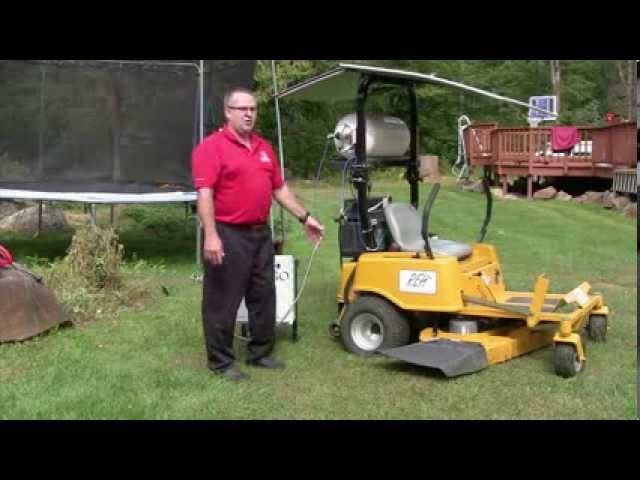
This image is property of i.ytimg.com.
Working Principles of Hydrogen Fuel Cells
In a hydrogen fuel cell, hydrogen gas is supplied to the anode, while oxygen or air is supplied to the cathode. The hydrogen molecules split into protons and electrons at the anode, with the protons passing through a polymer electrolyte membrane to the cathode. The electrons, unable to pass through the membrane, travel through an external circuit, generating an electric current that can be used to power electrical devices or charge batteries. At the cathode, the protons, electrons, and oxygen molecules combine, producing water as the only byproduct.
Components of Hydrogen Fuel Cells
Hydrogen fuel cells consist of several key components, including an anode, a cathode, and an electrolyte. The anode is typically a platinum-coated catalyst that facilitates the separation of hydrogen molecules into protons and electrons. The cathode, also coated with a catalyst, facilitates the reaction that combines protons, electrons, and oxygen to form water. The polymer electrolyte membrane separates the anode and cathode compartments, allowing only protons to pass through while blocking the electron flow. The membrane ensures the efficient flow of protons and prevents cross-contamination of gases.
Comparison with Other Power Sources
Hydrogen fuel cells offer several advantages over other power sources commonly used in commercial lawn mowers. Compared to gasoline-powered mowers, hydrogen mowers produce no harmful emissions, making them environmentally cleaner. In contrast to electric mowers that rely on battery storage, hydrogen mowers provide longer operating times and quick refueling, making them more suitable for continuous and demanding lawn care operations. Furthermore, fuel cell mowers offer comparable efficiency to electric mowers, while retaining the convenience and power of traditional gas mowers.
Safety Considerations
Safety is a paramount concern when it comes to the adoption of any new technology, including hydrogen fuel cells. While hydrogen is a highly flammable gas, proper safety measures and protocols can minimize the risks associated with its storage and use. Hydrogen fuel cells are designed with safety features, such as pressure relief valves and sensors, to prevent overpressure and detect leaks. Additionally, the use of hydrogen fuel cell systems in commercial lawn mowers is subject to rigorous safety standards and regulations, ensuring the protection of both operators and the surrounding environment.
Implementation Challenges and Solutions
Infrastructure Development for Hydrogen Distribution
One of the significant challenges in adopting hydrogen-powered commercial lawn mowers is the lack of an extensive hydrogen refueling infrastructure. While gasoline is readily available at gas stations, hydrogen refueling stations are still relatively scarce. To overcome this challenge, there is a need for concerted efforts from government entities and private stakeholders to invest in the development of hydrogen refueling infrastructure, particularly in areas where commercial lawn care operations are prevalent.
Cost Considerations
The initial cost of hydrogen fuel cell systems can be higher compared to traditional gasoline or electric mowers. This cost disparity is primarily due to the complex and expensive nature of hydrogen production and storage technologies. However, it is important to consider the long-term cost benefits and return on investment (ROI) associated with hydrogen-powered mowers. Lower operational and maintenance costs, coupled with potential government incentives and grants, can offset the initial investment and make hydrogen mowers more financially viable in the long run.
Availability of Hydrogen Fuel
The availability of hydrogen fuel is another challenge that needs to be addressed for widespread adoption of hydrogen-powered commercial lawn mowers. Currently, hydrogen production is limited and mainly sourced from fossil fuels, which undermines the environmental advantages of fuel cell technology. However, emerging technologies such as renewable hydrogen production through electrolysis using renewable energy sources offer a sustainable solution. The development of a robust and eco-friendly hydrogen supply chain is crucial to ensure the availability of hydrogen fuel for commercial lawn care operations.

This image is property of www.hydrogenfuelnews.com.
Training and Education for Operators
Another implementation challenge is the need for training and education of operators on the use and maintenance of hydrogen fuel cell systems. While the technology offers numerous benefits, operators must be properly equipped with the knowledge and skills to handle fuel cell mowers safely and efficiently. Training programs should cover topics such as refueling procedures, system operation, and basic troubleshooting. By providing comprehensive training and educational resources, operators can confidently embrace the transition to hydrogen-powered commercial lawn mowers.
Regulatory and Safety Standards
The successful implementation of hydrogen-powered commercial lawn mowers is contingent upon the establishment of regulatory frameworks and safety standards. These standards should ensure the safe handling, storage, and operation of hydrogen fuel cell systems. Regulatory bodies play a crucial role in monitoring and enforcing compliance with these standards, ensuring the protection of operators, consumers, and the environment. Collaborative efforts among industry stakeholders, regulatory authorities, and safety organizations are essential to establish a comprehensive framework that facilitates the safe and efficient adoption of hydrogen fuel cell technology in commercial lawn care.
Case Studies: Successful Deployments
Manufacturer A’s Hydrogen-powered Commercial Lawn Mower
Manufacturer A, an innovative leader in the lawn care industry, successfully introduced a hydrogen-powered commercial lawn mower to the market. By leveraging hydrogen fuel cell technology, their mower offers zero-emission operation and extended run time, allowing operators to tackle large areas efficiently. The quick refueling capability and reduced maintenance requirements have garnered positive feedback from operators. Manufacturer A’s mower has set a benchmark for sustainability and performance in the commercial lawn care industry.
City B’s Adoption of Hydrogen Fuel Cell Lawn Mowers
In an effort to reduce carbon emissions and noise pollution in public spaces, City B embraced the use of hydrogen fuel cell lawn mowers for their municipal lawn care operations. The transition has significantly improved air quality and reduced noise levels, creating a more pleasant and environmentally-friendly urban environment. By leading the way in sustainable practices, City B serves as a role model for other cities looking to enhance their green initiatives and prioritize the well-being of their communities.
Benefits Experienced by Company C
Company C, a commercial lawn care service provider, reaped numerous benefits from adopting hydrogen-powered mowers into their fleet. The extended operating time allowed their operators to cover larger areas without the need for frequent refueling, enhancing productivity and reducing downtime. The reduced maintenance requirements led to cost savings and improved equipment reliability. Furthermore, Company C’s commitment to sustainability and environmentally-friendly practices resulted in an enhanced brand image, attracting eco-conscious clients and boosting their competitive edge in the market.
Environmental Impact and Sustainability
Reduction of Greenhouse Gas Emissions
Hydrogen-powered commercial lawn mowers contribute significantly to the reduction of greenhouse gas emissions. By eliminating the combustion of fossil fuels, these mowers prevent the release of carbon dioxide (CO2) and other harmful pollutants into the atmosphere. Considering the substantial carbon footprint of traditional gas-powered mowers, the adoption of hydrogen fuel cell technology is a crucial step towards achieving climate change mitigation goals and creating a more sustainable future.
Positive Effects on Air Quality
The use of hydrogen fuel cell technology in commercial lawn mowers has a positive impact on air quality. Traditional gasoline mowers emit pollutants such as nitrogen oxides (NOx) and particulate matter, which contribute to respiratory issues and degrade air quality. Hydrogen fuel cell mowers produce no harmful emissions, reducing the health risks associated with poor air quality and promoting cleaner and healthier environments, particularly in densely populated areas.
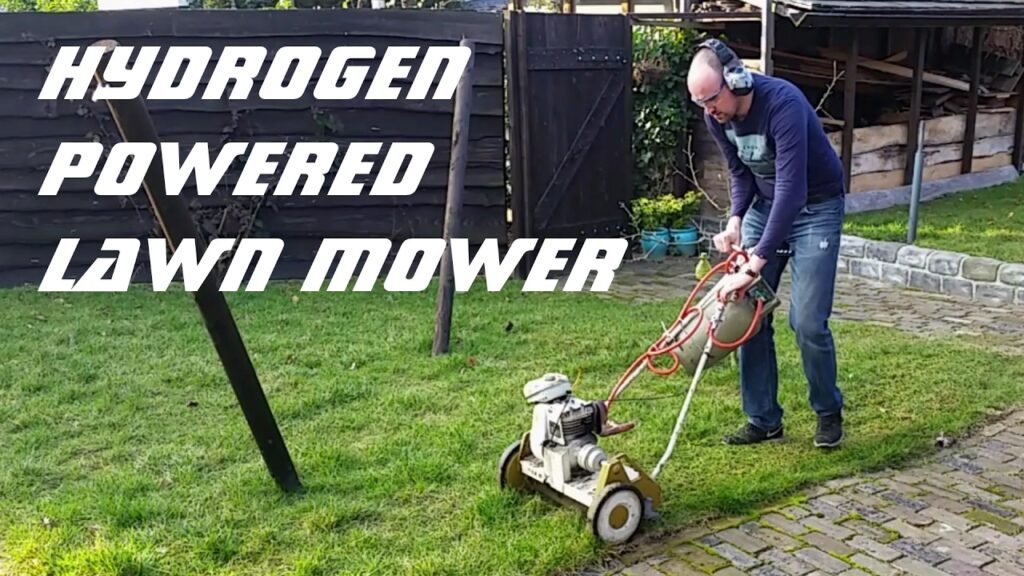
This image is property of i.ytimg.com.
Compatibility with Renewable Hydrogen Production
The compatibility of hydrogen fuel cell technology with renewable hydrogen production is a key aspect of its environmental impact and sustainability. As renewable energy sources such as solar and wind become increasingly prevalent, the production of hydrogen from renewable sources offers a carbon-neutral fuel option. Renewable hydrogen production through electrolysis ensures that the entire lifecycle of hydrogen fuel cell mowers remains environmentally friendly, further reducing reliance on fossil fuels and mitigating environmental impact.
Recycling and Disposal Considerations
The environmental sustainability of hydrogen fuel cell technology extends to the end-of-life stage of the equipment. Fuel cells contain valuable materials such as platinum, which can undergo recycling and reclamation processes. The recycling of fuel cell components reduces the need for new raw materials and minimizes waste generation. Proper disposal practices for fuel cell components that cannot be recycled ensure the safe management of potentially hazardous materials, enhancing the overall sustainability of hydrogen-powered commercial lawn mowers.
Cost Analysis and Return on Investment
Initial Investment in Hydrogen-powered Systems
The initial investment in hydrogen-powered commercial lawn mowers may be higher compared to traditional gasoline or electric mowers. However, it is essential to evaluate the long-term cost benefits and return on investment (ROI). While the upfront costs of hydrogen fuel cell systems may be higher, the lower operational and maintenance costs over the lifespan of the equipment can offset the initial investment. Additionally, potential government incentives and grants aimed at promoting clean technologies can further enhance the financial viability of hydrogen-powered mowers.
Operational Cost Comparison with Traditional Lawn Mowers
When considering the operational costs of hydrogen-powered commercial lawn mowers, several factors need to be taken into account. While the cost of hydrogen fuel may vary depending on the region and availability, it is generally comparable to the cost of gasoline. However, hydrogen mowers have a lower maintenance cost due to their simpler design and fewer moving parts. The reduced need for oil changes, spark plug replacements, and other maintenance tasks contributes to cost savings over the lifespan of the equipment.
Long-term Financial Benefits
The adoption of hydrogen-powered commercial lawn mowers can yield significant long-term financial benefits. The improved efficiency and extended operating time of hydrogen mowers enhance productivity and allow operators to cover larger areas within the same time frame. The reduced reliance on refueling and maintenance requirements further contribute to minimizing downtime and maximizing operational efficiency. These advantages translate into higher revenue generation and cost savings, ultimately leading to improved profitability and a positive ROI for commercial lawn care businesses.
Government Incentives and Grants
To promote the adoption of clean and sustainable technologies, governments often provide incentives and grants to businesses that invest in hydrogen fuel cell systems. These incentives can take various forms, such as tax credits, subsidies, and financial assistance for equipment purchases. Leveraging these government programs can significantly reduce the initial investment costs and accelerate the return on investment for commercial lawn care operators. It is important for businesses to explore and take advantage of these opportunities to maximize the financial benefits of hydrogen-powered mowers.
Advancements in Hydrogen Fuel Cell Technology
Research and Development Efforts
Ongoing research and development efforts in hydrogen fuel cell technology are driving advancements in the efficiency, durability, and cost-effectiveness of fuel cell systems. Scientists, engineers, and industry experts are continuously innovating and optimizing fuel cell components, exploring new catalyst materials, and refining system designs. Through collaborations between academia, industry, and government institutions, these research efforts are accelerating the progress of hydrogen fuel cell technology and paving the way for improved performance and wider adoption across various applications, including commercial lawn mowers.

This image is property of www.focusonequipmentrentals.com.
Improvements in Fuel Cell Efficiency
Fuel cell efficiency is a critical factor in the effectiveness and viability of hydrogen-powered commercial lawn mowers. Researchers are focused on enhancing the efficiency of fuel cell systems to maximize the conversion of hydrogen into usable electrical energy. Through advancements in catalyst design, membrane materials, and system optimization, fuel cell efficiency continues to improve. Higher efficiency translates into improved performance, longer operating times, and reduced energy consumption, making hydrogen mowers even more attractive for commercial lawn care operators.
Integration with Smart Technology
The integration of hydrogen fuel cell technology with smart technology is an emerging trend that holds great potential for commercial lawn mowers. By incorporating sensors, data analytics, and remote monitoring capabilities, fuel cell mowers can be optimized for maximum efficiency. Smart technology can enable operators to track performance, diagnose issues, and schedule maintenance in a proactive manner. Furthermore, data collected from these mowers can be analyzed to identify patterns, optimize operational strategies, and further enhance the overall efficiency and sustainability of commercial lawn care operations.
Emerging Trends and Innovations
Various emerging trends and innovations are revolutionizing the hydrogen fuel cell industry. One notable innovation is the development of solid-state fuel cells, which eliminate the need for a liquid electrolyte and enhance system stability. Researchers are also exploring the use of alternative catalyst materials, such as non-precious metals, to reduce costs and improve sustainability. Additionally, advancements in hydrogen storage and distribution technologies are enabling the development of compact and efficient fueling solutions, further enhancing the viability and practicality of hydrogen-powered commercial lawn mowers.
Hydrogen Fuel Infrastructure Development
Current Status of Hydrogen Refueling Stations
The current status of hydrogen refueling stations varies depending on the region and country. While some areas have a well-established network of refueling stations, others have limited availability. Particularly in the context of commercial lawn care operations, it is important to consider the proximity of refueling stations to work sites. The accessibility and availability of refueling infrastructure are key factors that need to be addressed to ensure the successful adoption of hydrogen-powered commercial lawn mowers.
Expansion Plans and Initiatives
In response to the growing demand for hydrogen infrastructure, numerous expansion plans and initiatives are being implemented globally. Governments, energy companies, and private investors are working together to develop a comprehensive network of hydrogen refueling stations. These initiatives aim to bridge the infrastructure gap, enhance fuel accessibility, and facilitate the widespread adoption of hydrogen fuel cell technology. By scaling up the infrastructure, commercial lawn care operators can confidently transition to hydrogen-powered mowers without concerns about refueling limitations.
Collaboration with Energy Companies
Collaboration between energy companies and stakeholders in the hydrogen fuel cell industry is instrumental in infrastructure development. Energy companies with experience in fuel storage, transportation, and delivery play a vital role in establishing hydrogen supply chains and refueling infrastructure. Through partnerships and collaborations, these companies leverage their expertise and resources to expedite the growth of hydrogen refueling stations. Together, they work towards building a robust and reliable hydrogen infrastructure that supports not only commercial lawn care but also other sectors embracing fuel cell technologies.
Future Outlook for Infrastructure Growth
The future outlook for hydrogen fuel infrastructure growth is promising, driven by the increasing recognition of hydrogen as a clean and sustainable energy carrier. Governments worldwide are setting ambitious targets and allocating significant investments to accelerate the development of hydrogen infrastructure. Additionally, advancements in hydrogen production technologies, such as renewable hydrogen production through electrolysis, further enhance the sustainability of hydrogen fuel. As the infrastructure continues to expand, the adoption of hydrogen-powered commercial lawn mowers will become increasingly accessible and practical.
Comparison with Electric Lawn Mowers
Energy Storage and Range Considerations
One significant advantage of hydrogen-powered commercial lawn mowers over electric mowers is the energy storage capacity and range. Electric mowers rely on batteries with limited storage capabilities, resulting in shorter run times. In contrast, hydrogen mowers can store a larger quantity of energy in the form of hydrogen gas, enabling them to operate for longer durations without the need for recharging or swapping batteries. This extended range makes hydrogen mowers highly suitable for commercial applications that require continuous and uninterrupted operation.
Charging Time and Convenience
Charging time is a crucial consideration for commercial lawn care operators. Electric mowers typically require several hours to fully charge their batteries, which can result in significant downtime. In contrast, hydrogen mowers can be quickly refueled, similar to refueling a gasoline mower. The quick refueling process enables operators to resume work promptly, contributing to improved productivity and reduced downtime. The convenience and time-saving aspects of refueling make hydrogen mowers a practical choice for commercial lawn care businesses.
Environmental Impact Comparison
Both hydrogen and electric mowers offer environmental benefits compared to traditional gasoline mowers. Hydrogen mowers produce zero emissions, while electric mowers emit no tailpipe emissions during operation. However, the environmental impact of electric mowers is dependent on the source of electricity used for charging. If the electricity comes from renewable sources, such as solar or wind, the environmental footprint of electric mowers can be minimized. It is important to consider the overall lifecycle impact, including production, operation, and disposal, when comparing the environmental benefits of hydrogen and electric mowers.
Adaptability to Commercial Applications
Commercial lawn care operations often involve demanding tasks, such as mowing large areas and handling tough grass and debris. Hydrogen-powered mowers offer high performance and power, making them well-suited for commercial applications. The extended operating time, quick refueling, and durability of hydrogen mowers ensure efficient and reliable operation in demanding conditions. Furthermore, the reduced noise levels of hydrogen mowers make them particularly suitable for noise-sensitive environments, such as residential areas and parks.
Operational Efficiency
Operational efficiency is a critical consideration for commercial lawn care businesses. Hydrogen mowers provide extended operating times without sacrificing power, allowing operators to cover large areas efficiently. In contrast, the run time of electric mowers is limited by the battery capacity, requiring frequent recharging. The extended run times of hydrogen mowers translate into improved productivity, reduced downtime, and enhanced operational efficiency. The convenience of quick refueling and lower maintenance requirements further contribute to the overall efficiency and cost-effectiveness of hydrogen-powered commercial lawn mowers.
Future Prospects and Adoption
Trends in Commercial Lawn Care Industry
The commercial lawn care industry is experiencing a shift towards sustainable and environmentally friendly practices. Clients are increasingly prioritizing businesses that demonstrate a commitment to reducing their environmental impact. As a result, the adoption of hydrogen-powered commercial lawn mowers aligns with emerging trends and positions businesses as leaders in sustainability. By embracing hydrogen fuel cell technology, commercial lawn care operators can attract eco-conscious clients, meet evolving market demands, and differentiate themselves in a competitive industry.
Potential for Increased Market Penetration
The potential for increased market penetration of hydrogen-powered commercial lawn mowers is significant. As awareness of hydrogen fuel cell technology grows and the infrastructure develops, more commercial lawn care operators will recognize the benefits and embrace the transition. The advantages offered by hydrogen mowers, such as reduced carbon emissions, longer operating times, and quick refueling, are compelling factors for adoption. With governmental support, incentives, and grants, the market penetration of hydrogen-powered mowers is poised to increase, driving sustainable growth in the commercial lawn care industry.
Challenges to Widespread Adoption
Despite the numerous advantages of hydrogen-powered commercial lawn mowers, several challenges may hinder widespread adoption. These challenges include the limited availability of hydrogen refueling infrastructure, higher initial investment costs compared to traditional mowers, and the need for operator training and education. However, these challenges are not insurmountable. Through collaborative efforts among stakeholders, infrastructure development, and effective communication, these obstacles can be overcome, paving the way for the widespread adoption of hydrogen fuel cell technology in the commercial lawn care sector.
Future Integration with Autonomous Technologies
The integration of hydrogen fuel cell technology with autonomous technologies is an exciting prospect for the commercial lawn care industry. Autonomous lawn mowers equipped with hydrogen fuel cells can operate independently, performing lawn care tasks without direct human intervention. This integration offers numerous benefits, including enhanced efficiency, reduced labor costs, and improved safety. By combining the advantages of hydrogen fuel cell technology with autonomous capabilities, the future of commercial lawn care holds tremendous potential for increased productivity, cost savings, and further reductions in carbon emissions.
In conclusion, hydrogen-powered commercial lawn mowers offer a range of advantages that make them an attractive choice for the industry. From reduced carbon emissions and lower noise levels to increased efficiency, longer operating times, and quick refueling, the benefits of hydrogen fuel cell technology are compelling. While challenges such as infrastructure development, cost considerations, and safety standards need to be addressed, collaborative efforts and advancements in the field are driving progress.
With successful case studies already in place, the environmental impact and sustainability benefits of hydrogen mowers are evident. The reduced greenhouse gas emissions, improved air quality, and compatibility with renewable hydrogen production contribute to a greener future. Furthermore, the cost analysis and return on investment highlight the long-term financial benefits and potential government incentives available for commercial lawn care operators.
Advancements in hydrogen fuel cell technology, such as research and development efforts, improvements in efficiency, integration with smart technology, and emerging trends, ensure the continuous innovation and evolution of hydrogen mowers. As hydrogen fuel infrastructure continues to develop, it creates new opportunities for market penetration and enhances the viability of hydrogen-powered mowers.
When comparing hydrogen mowers with electric mowers, factors such as energy storage, charging time, environmental impact, adaptability to commercial applications, and operational efficiency highlight the advantages of hydrogen mowers, particularly in demanding and reliable operation.
The future prospects and adoption of hydrogen-powered mowers are promising, with trends in the commercial lawn care industry favoring sustainable practices. Challenges to widespread adoption exist, but with the continuous development of infrastructure, increased market penetration is anticipated. Moreover, the future integration of hydrogen fuel cell technology with autonomous technologies offers a pathway to further enhance the productivity, cost-effectiveness, and sustainability of commercial lawn care operations.
By embracing hydrogen-powered commercial lawn mowers, businesses can position themselves as leaders in sustainability, meet evolving market demands, and contribute to creating a greener and healthier environment. The path to a sustainable future begins with innovative and environmentally friendly choices in the commercial lawn care industry.


